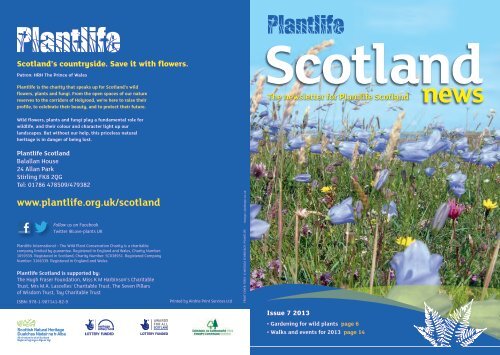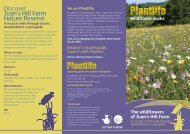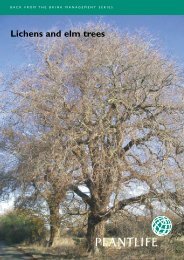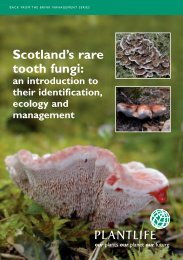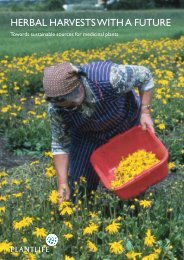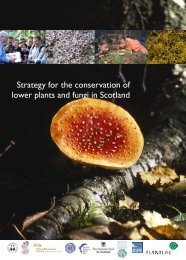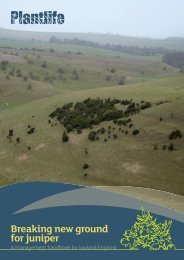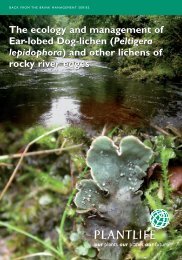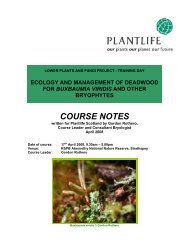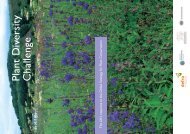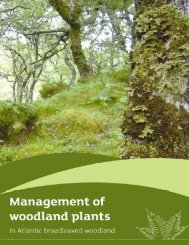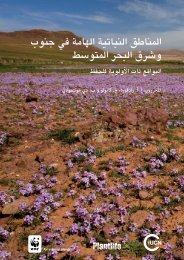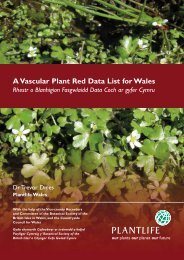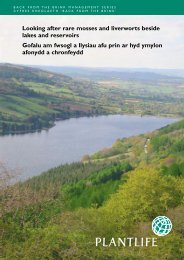Download this publication - Plantlife
Download this publication - Plantlife
Download this publication - Plantlife
Create successful ePaper yourself
Turn your PDF publications into a flip-book with our unique Google optimized e-Paper software.
Scotland’s countryside. Save it with flowers.<br />
Patron: HRH The Prince of Wales<br />
<strong>Plantlife</strong> is the charity that speaks up for Scotland’s wild<br />
flowers, plants and fungi. From the open spaces of our nature<br />
reserves to the corridors of Holyrood, we’re here to raise their<br />
profile, to celebrate their beauty, and to protect their future.<br />
Scotland<br />
The newsletter for <strong>Plantlife</strong> Scotland news<br />
Wild flowers, plants and fungi play a fundamental role for<br />
wildlife, and their colour and character light up our<br />
landscapes. But without our help, <strong>this</strong> priceless natural<br />
heritage is in danger of being lost.<br />
<strong>Plantlife</strong> Scotland<br />
Balallan House<br />
24 Allan Park<br />
Stirling FK8 2QG<br />
Tel: 01786 478509/479382<br />
www.plantlife.org.uk/scotland<br />
Follow us on Facebook<br />
Twitter @Love-plants UK<br />
<strong>Plantlife</strong> International – The Wild Plant Conservation Charity is a charitable<br />
company limited by guarantee. Registered in England and Wales, Charity Number:<br />
1059559. Registered in Scotland, Charity Number: SC038951. Registered Company<br />
Number: 3166339. Registered in England and Wales<br />
<strong>Plantlife</strong> Scotland is supported by:<br />
The Hugh Fraser Foundation, Miss K M Harbinson’s Charitable<br />
Trust, Mrs M.A. Lascelles’ Charitable Trust, The Seven Pillars<br />
of Wisdom Trust, Tay Charitable Trust<br />
ISBN: 978-1-907141-82-9<br />
Printed by Airdrie Print Services Ltd<br />
FRONT COVER: TIREE © MATILDA SCHARSACH / PLANTLIFE Design: rjpdesign.co.uk<br />
Issue 7 2013<br />
• Gardening for wild plants page 6<br />
• Walks and events for 2013 page 14
Welcome<br />
Welcome to the annual newsletter<br />
from <strong>Plantlife</strong> Scotland. Inside we<br />
show you some of the wonderful<br />
things we’re doing thanks to<br />
members’ support.<br />
We also suggest many other ways you can get involved with our<br />
work, and help share with you our love of wild plants and fungi.<br />
Highlights of last year included great swathes of twinflower<br />
thriving at our woodland management trial sites. We also ran<br />
our first seaweed walk, among other popular guided walks.<br />
On a different note, autumn brought us two new, and fatal,<br />
plant diseases. Juniper, a priority species for <strong>Plantlife</strong>, has<br />
been affected by a new disease Phytophthera austrocedrae.<br />
And later in the year, ash dieback Chalara fraxinea was<br />
discovered in sites across Scotland. This year <strong>Plantlife</strong> will<br />
continue working with the Government to try to prevent more<br />
new diseases infecting plants in the wild.<br />
So what else will 2013, Year of Natural Scotland, hold for us<br />
We’ll be launching our new Wild About Plants project,<br />
bringing lots of plant and fungi activities for families across<br />
Scotland (see opposite).<br />
We’re also looking forward to working with our MSP Species<br />
Champions at Holyrood, who are adopting wild plants and<br />
fungi and helping us highlight the issues they face in 2013<br />
(see page 10).<br />
And we’ve another packed events programme (page 14)<br />
that includes walks, workshops and more.<br />
Look out for us at the Birdfair and Gardening Scotland, and<br />
come and say hello. And please tell your friends about us.<br />
Scotland goes<br />
Wild about Plants<br />
Wild About Plants is our new<br />
initiative to encourage people<br />
to explore gardens, parks and<br />
wild places.<br />
We’ve come up with a fabulous set of activity<br />
sheets for children and families, with games,<br />
puzzles and activities to encourage young<br />
people to explore the outdoors and to learn to<br />
love wild plants and fungi – not just in the<br />
countryside but in cities as well. There are also<br />
stickers and badges, and a colourful poster<br />
showing how amazing wild plants and fungi<br />
are, as well as the important relationship they<br />
have with Scotland’s insects and other animals.<br />
Over coming months we’ll be running<br />
workshops, walks and family activity days<br />
across Scotland. These will include painting<br />
with mushrooms and dying wool with natural<br />
dyes from plants.<br />
We have developed strong links with project<br />
partners, including Glasgow City Council, West<br />
Dunbartonshire Environment Trust, Central<br />
Scotland Forest Trust, the Centre for<br />
Stewardship, Falkland, and the Community<br />
Woodlands Association. The project is part of<br />
<strong>Plantlife</strong>’s UK-wide Wild About Plants initiative,<br />
and is funded by the Heritage Lottery Fund<br />
and Scottish Natural Heritage.<br />
in conservation work led by the Glasgow<br />
Countryside Rangers and Conservation Team.<br />
© DP / PLANTLIFE<br />
Deborah Long<br />
<strong>Plantlife</strong> Scotland Programme Manager<br />
This issue of Scotland news is written by Davie Black, Deborah Long,<br />
Ali Murfitt, Matilda Scharsach and Jill Williams<br />
Why not come to our launch event in Linn<br />
Park, Glasgow, on Sunday 28 April and take<br />
part in wild plant craft workshops, family<br />
activities and games. You can also participate<br />
To find out more, go to<br />
www.wildaboutplants.org.uk/scotland<br />
where you can download our resources<br />
for free.<br />
<strong>Plantlife</strong> Scotland News 2013<br />
<strong>Plantlife</strong> Scotland News 2013<br />
3
Flora Guardians<br />
Helping to save Scotland’s wild flowers<br />
Our Flora Guardians are doing fantastic work throughout<br />
Scotland, monitoring 18 rare, vulnerable, threatened or<br />
invasive plant species.<br />
These range from small damp-loving liverworts<br />
such as deceptive featherwort Adelanthus<br />
decipiens, through the ledge-clinging sticky<br />
catchfly Silene viscaria, to large shrubs in the<br />
hills including juniper Juniperus communis.<br />
This summer we’ll be focussing on two species,<br />
the invasive butterfly-bush Buddleja davidii, and<br />
purple milk-vetch Astragalus danicus.<br />
Could you help us by becoming a Flora Guardian<br />
You don’t have to be a botanical expert to get<br />
involved; recording methods are simple.<br />
If you’d like to consider becoming a Flora<br />
Guardian, why not come to one of our workshops<br />
over the summer and we’ll show you how to<br />
record these plants.<br />
Contact Davie Black on 01786 469778 or<br />
davie.black@plantlife.org.uk<br />
Jane’s story<br />
At Bin Forest, near Huntly, Flora<br />
Guardian Jane Sim has been<br />
monitoring twinflower. Her experience<br />
illustrates the importance of <strong>this</strong><br />
work and what can be achieved.<br />
“I’ve been monitoring twinflower<br />
and creeping lady’s-tresses on an<br />
annual basis at Bin Hill,” says<br />
Jane. “I’ve found that although the<br />
twinflower has been dying out in<br />
places, it still grows well where<br />
trees have been thinned to let in<br />
more light.<br />
“I enjoy the volunteering because<br />
it is helping in some small way to<br />
aid conservation of the species<br />
and it also gives me a nice walk<br />
in the forest.”<br />
Jane’s monitoring clearly shows that<br />
dense conifer plantations with little<br />
light reaching the forest floor are no<br />
good for twinflower. Where Forest<br />
Enterprise thinned the trees in 2005,<br />
twinflower has survived or increased.<br />
Butterfly-bush is seen in many places, but<br />
actual records of its distribution are limited.<br />
In summer its flower heads attract many butterflies,<br />
like small tortoiseshell, peacock and red admiral. We<br />
want to know how existing ground flora copes with<br />
<strong>this</strong> non-native species, so we want to measure how<br />
quickly it spreads from a central clump.<br />
© GBNNSS<br />
Purple milk-vetch is a lovely flower found<br />
mainly in the mineral-rich coastal turf behind sand<br />
dunes, and on sandstone sea-cliffs. It can also be<br />
found inland, as in Holyrood Park in Edinburgh. We<br />
would like to know more about the distribution of<br />
<strong>this</strong> plant as it can be vulnerable to changes in the<br />
short turf that it prefers.<br />
© TIM PANKHURST / PLANTLIFE<br />
TWINFLOWER © DEBORAH LONG/PLANTLIFE<br />
Although the twinflower is<br />
continuing to expand by means of<br />
runners from existing plants, as yet<br />
there is no sign of flowers despite the<br />
increased light. It can take years<br />
before twinflower shoots produce<br />
flowers, so we hope Jane can<br />
continue her excellent work to<br />
see if flowers start to appear.<br />
Once <strong>this</strong> happens, we can begin to<br />
think about how we can increase<br />
seed production at Bin Forest to<br />
guarantee a future for twinflower.<br />
4 <strong>Plantlife</strong> Scotland News 2013<br />
<strong>Plantlife</strong> Scotland News 2013<br />
5
© MATILDA SCHARSACH/PLANTLIFE<br />
Grow Wild<br />
Gardening for wild plants in Scotland<br />
There are 150 square miles of domestic gardens in urban<br />
Scotland alone, and perhaps the same again, if not more,<br />
in rural areas. Our new leaflet on gardening for wild plants<br />
highlights the amazing opportunity we have to use these<br />
spaces to complement Scotland’s disappearing habitats.<br />
This leaflet is not a how-to manual, but is designed to inspire<br />
people to increase the wildlife in their gardens.<br />
We’re asking people to use alternatives to peat products, and<br />
showing how a more relaxed approach to gardening, without<br />
heavy use of mowers, herbicides or pesticides, is an easy way<br />
to create great wild plant habitats.<br />
We also show how native wild plants in your garden can be a<br />
wonderful feast for the senses, from fragrant meadow flowers<br />
to stunning woodland plants alongside a hedge.<br />
<strong>Download</strong> your free leaflet and find out<br />
more about our Grow Wild initiative at<br />
www.plantlife.org.uk/scotland<br />
© JULIE REDMAN<br />
This flowery back-garden meadow<br />
including buttercups and ox-eye daisies is<br />
a riot of colour and a great place for<br />
children to play, as well as attracting<br />
butterflies and other wildlife.<br />
A beautiful wildlife garden created by<br />
<strong>Plantlife</strong> member Julie Redman in Fife.<br />
Behind the pond bordered with<br />
ragged-robin and yellow flag, there is a<br />
wild flower border and a hedge of native<br />
species including blackthorn and dog rose.<br />
6<br />
<strong>Plantlife</strong> Scotland News 2013<br />
<strong>Plantlife</strong> Scotland News 2013 7
<strong>Plantlife</strong> Scotland helps<br />
landowners and land<br />
managers with conservation<br />
advice. We do <strong>this</strong> through<br />
site visits and organising<br />
demonstration days,<br />
where we show how to<br />
look after plants in<br />
key habitats.<br />
On the ground<br />
<strong>Plantlife</strong>’s advisory work<br />
Advising landowners of vulnerable plants<br />
on their land is useful, but it’s even more<br />
important to show them how they can look<br />
after them.<br />
Take Nigel and Glynda Hill, who own 60<br />
hectares of plantation woodland on a hillside<br />
near Pitlochry. They have scattered juniper<br />
bushes in the woodland but these were in<br />
poor condition, mainly due to shade from<br />
maturing sitka spruce. The Hills wanted<br />
advice about reviving the juniper plants.<br />
They were already felling the spruce to open<br />
up areas that contained mature Scots pine,<br />
downy birch and juniper. This would help<br />
the surviving mature juniper plants, but<br />
what about regeneration<br />
It would be difficult for juniper to<br />
regenerate from seed under the thick<br />
bracken on the site, and removing the<br />
bracken through grazing was difficult<br />
due to various site constraints.<br />
<strong>Plantlife</strong>’s Davie Black<br />
therefore advised<br />
cutting back the<br />
bracken in June to<br />
weaken it. Meanwhile,<br />
he advised taking<br />
hardwood cuttings of juniper, growing them<br />
on and planting them out to create a new<br />
generation of young juniper bushes.<br />
As well as advisory site visits like these,<br />
<strong>Plantlife</strong> Scotland runs demonstration days<br />
on key habitats and species, to bring<br />
together land managers and experts. We’ll<br />
be running more demonstration days in<br />
2013 – find out more at<br />
www.plantlife.org.uk/scotland.<br />
© SMALL FROG – ISTOCK<br />
Where the wild things were<br />
The state of Scotland’s plants<br />
How are our wild flowers faring<br />
Not so well, according to our report<br />
Our Vanishing Flora, published<br />
recently. Plants across Britain are<br />
declining, and the most significant<br />
declines are in Scotland.<br />
The county of Banffshire recorded the highest<br />
rate of loss of species over the past 60 years, at<br />
a rate of nearly one per year. The Outer Hebrides,<br />
North Aberdeenshire and Angus are losing on<br />
average one species every three years, while<br />
Caithness, Easter Ross and Assynt are losing<br />
roughly one species every decade. In total,<br />
Scotland lost 97 species – 53 flowering plants, 28<br />
mosses and liverworts and 16 lichens. Read the<br />
report at www.plantlife.org.uk and search<br />
under “Our Vanishing Flora”<br />
If you’ve been helping with our Common Plant<br />
Survey, now renamed Wildflowers Count, thank<br />
you. You’re already helping us track the changes<br />
across Great Britain. We aim to use your data to<br />
inform government about the state of plants in<br />
Scotland. However, we will need more data from<br />
across Scotland to support meaningful analysis.<br />
In the meantime we are looking into ways of<br />
sharing the data with others, including publishing<br />
it online through iRecords, a new Biological<br />
Records Centre database.<br />
Could you help us show the Government what is<br />
happening to our common plants across Scotland<br />
by signing up to do the Wildflowers Count survey<br />
It’s easy, fun – and sociable too. Why not go out<br />
with a group of friends to look for, record and<br />
learn about new plants together, and then retire<br />
to a local café to write up your results<br />
We run Wildflowers Count workshops around<br />
Scotland, where you can learn the ropes (see our<br />
events calendar, page 14). Or why not take the<br />
plunge and go to our website for a pack:<br />
www.plantlife.org.uk/wildflowerscount<br />
TOP: WILDFLOWERS ON TIREE; © M SCHARSACH/PLANTLIFE MAP COPYRIGHT PLANTLIFE<br />
8 <strong>Plantlife</strong> Scotland News 2013<br />
<strong>Plantlife</strong> Scotland News 2013<br />
9
Roadshow toolkits<br />
Helping to spread the word<br />
Scottish primrose Primula scotica<br />
Wildlife champions at Holyrood<br />
<strong>Plantlife</strong> Scotland is part of a Scottish<br />
Environment LINK initiative asking<br />
MSPs to adopt a species and promote<br />
its conservation at Holyrood. We’re<br />
calling these MSPs Species Champions.<br />
This is the next stage of our Wildlife<br />
Proclamation, which invited MSPs to<br />
sign up to do what they can for Scottish<br />
wildlife. You can find out more at<br />
www.scotlink.org/public/work/specieschampions.php<br />
As we went to press, 21 MSPs had<br />
signed up to be Species Champions, of<br />
whom six are championing wild plants.<br />
Liam McArthur, MSP for Orkney, was<br />
one of the first and has adopted the<br />
Scottish primrose (pictured) which he<br />
describes as “an iconic feature of the<br />
landscape of the north of Scotland”.<br />
So why not encourage your MSP to<br />
adopt one of Scotland’s iconic plants or<br />
fungi Find the contact details for your<br />
MSP at www.scottish.parliament.uk<br />
© LORNE GILL/SNH<br />
Roadshow Toolkits are boxes<br />
of <strong>Plantlife</strong> goodies such<br />
as leaflets, posters and<br />
badges, which are<br />
taken to events by<br />
our volunteers. In<br />
2012, they helped<br />
convey our<br />
messages about<br />
wild plants and<br />
their conservation<br />
to around 23,000<br />
people we<br />
otherwise wouldn’t<br />
have reached.<br />
Our Roadshow Toolkits, which<br />
are funded by the National<br />
Lottery Awards for All Scheme, have<br />
proved really popular. Catherine Lloyd, Tayside’s<br />
Biodiversity Partnership Coordinator, says:<br />
“<strong>Plantlife</strong> Scotland's toolkit was very easy to use<br />
and I was pleased to include it with our own<br />
<strong>Plantlife</strong> talks<br />
Could you be a local<br />
wild flower champion<br />
Could you give a talk about the work of <strong>Plantlife</strong><br />
in your community We’ll provide the script and<br />
a simple presentation full of fabulous photos;<br />
you’ll be helping spread the word about wild<br />
plants and fungi conservation in Scotland.<br />
If you’re interested, please contact Matilda<br />
Scharsach at <strong>Plantlife</strong> Scotland on 01786<br />
478509 or scotland@plantlife.org.uk<br />
<strong>publication</strong>s and displays at a<br />
number of events. The<br />
leaflets paved the way for<br />
discussing plant-related<br />
issues with a very<br />
wide variety of<br />
people, so I hope<br />
the Tayside<br />
Biodiversity<br />
Partnership in some<br />
small way helped<br />
spread the word<br />
about <strong>Plantlife</strong><br />
Scotland's aims."<br />
If you would be able to use<br />
a Roadshow Toolkit to spread<br />
the word about <strong>Plantlife</strong> at an<br />
event, then get in touch with Matilda<br />
Scharsach at Scotland@plantlife.org.uk<br />
The Roadshow Toolkit can be posted to you if<br />
required, and the contents can also be tailored<br />
to suit the occasion.<br />
10 <strong>Plantlife</strong> Scotland News 2013 <strong>Plantlife</strong> Scotland News 2013 11
MACHAIR ON TIREE IPA © MATILDA SCHARSACH<br />
Looking back at 2012<br />
Every year, <strong>Plantlife</strong> Scotland organises a<br />
busy programme of walks, workshops and<br />
events. From a stroll among summer wild<br />
flowers, to a workshop to sharpen up your<br />
plant identification skills, there’s something<br />
for everyone.<br />
A highlight of 2012 was our Scotland Members’<br />
Day, held in historic Callendar House in Falkirk,<br />
in October. After presentations on <strong>Plantlife</strong>’s<br />
work, we were treated to a stunning show of<br />
Scottish wildlife photographs by renowned<br />
photographer Laurie Campbell.<br />
Important Plant Areas<br />
Scotland now has 52 Important<br />
Plant Areas (IPAs) that are<br />
internationally recognised<br />
hotspots for wild plants. Over the<br />
past six years, <strong>Plantlife</strong> has been<br />
working with other organisations<br />
and volunteers to create site<br />
accounts for the IPAs, which<br />
means compiling maps, photos<br />
of key plants and information<br />
on why the site is so special.<br />
To celebrate and promote <strong>this</strong> network of sites,<br />
we’re launching four IPA walks in 2013. These<br />
will be at Ben Nevis, the Basalt outcrops in<br />
East Lothian (North Berwick Law and Traprain<br />
Law), and the oak woodlands at Glen Lednock,<br />
near Comrie.<br />
We’ll be running a guided walk at each site<br />
(see page 14), or look out for the walk<br />
leaflets at www.plantlife.org.uk/scotland.<br />
In the afternoon, workshops included the fungi<br />
and archaeology of Callendar Woods, papermaking<br />
using wild plants, and the history of<br />
wild plants in food – with some tasting and<br />
a demonstration thrown in.<br />
Our walks in 2012 included Appin in Argyll,<br />
taking in the rich mix of wild flowers on the old<br />
Ballachulish railway; the beautiful cliff-tops at<br />
St Abb’s Head and a seaweed walk at Lower<br />
Largo Bay in Fife.<br />
This year we have another full programme of<br />
events, including a guided walk up Ben Lawers<br />
to look at its iconic Alpine flora, a visit to the<br />
gardens of Haddo House to explore grassland<br />
fungi, and a fern identification workshop at<br />
Benmore fernery. Come and join us for a fun<br />
and informative day out.<br />
Our events for 2013 are on pages 14 - 17,<br />
and at www.plantlife.org.uk/scotland<br />
Members’ Day at Callendar House in 2012<br />
© ANDY MACDONALD<br />
12 <strong>Plantlife</strong> Scotland News 2013<br />
<strong>Plantlife</strong> Scotland News 2013<br />
13
<strong>Plantlife</strong> Scotland<br />
Events 2013<br />
March 2013<br />
Wildflowers Count survey<br />
2013<br />
Launched on the first day of<br />
spring. Sign up to participate<br />
at any time, through our<br />
website or by contacting the<br />
<strong>Plantlife</strong> Scotland office.<br />
Sat 9 - Sun 10 March,<br />
1 - 4pm<br />
John Hope Gateway at the<br />
Royal Botanic Garden<br />
Edinburgh<br />
Drop-in event. As the spring<br />
flowers emerge, it’s time to<br />
get wild about plants. Come<br />
along to explore the world of<br />
wild flowers, fungi, lichens<br />
and mosses through<br />
activities, folklore and craft.<br />
Free admission.<br />
Sun 21 April,<br />
10.30am - 4.30pm<br />
Holyrood Park, Edinburgh<br />
<strong>Plantlife</strong> and BSBI<br />
(Botanical Society of the<br />
British Isles): Getting to<br />
know your families. Find out<br />
about the basics of identifying<br />
wild flower families. Led by Dr<br />
Faith Anstey. Fee £10<br />
(students £5). For further<br />
information contact Ruth<br />
McGuire at<br />
bsbiscotland@gmail.com or<br />
on 07585 609008.<br />
Sat 27 April,<br />
10.30am - 4.30pm<br />
National Museum of Rural<br />
Life, Wester Kittochside, East<br />
Kilbride<br />
<strong>Plantlife</strong> and BSBI: Getting<br />
to know your families. For<br />
details see 21 April event.<br />
Sun 28 April, 12 - 3pm<br />
Linn Park Local Nature<br />
Reserve, Glasgow<br />
Drop-in event. Come along to<br />
the launch of Wild About<br />
Plants our new initiative to<br />
encourage people to explore<br />
their parks, gardens and wild<br />
spaces. There will be family<br />
activities, games and crafts<br />
with <strong>Plantlife</strong> and Glasgow<br />
Countryside Rangers and<br />
Conservation Team. Entrance<br />
to the park is adjacent to Linn<br />
Park golf course club house,<br />
Simhill Road, Glasgow G44 5TA.<br />
Sat 11 - Sun 12 May<br />
Hopetoun House, Edinburgh<br />
The Scottish Birdfair 2013.<br />
Come and see our stand at<br />
<strong>this</strong> event for bird and wildlife<br />
enthusiasts, on the lawns at<br />
Hopetoun House. Workshops,<br />
children’s events, live music<br />
and local food and drink.<br />
www.scottishbirdfair.org.uk<br />
Sat 18 May, 11am - 4pm<br />
Mugdock Country Park, near<br />
Milngavie, Glasgow<br />
Getting the most out of<br />
Wildflowers Count. A practical<br />
workshop, full of ideas and tips<br />
on what to look for, while<br />
enjoying a walk through the<br />
countryside, and contributing<br />
to our national plant survey.<br />
Sat 25 May<br />
Dumbreck Marsh, Kilsyth,<br />
North Lanarkshire<br />
BSBI Scotland field meeting<br />
with an emphasis on learning.<br />
The BSBI is keen to welcome<br />
people who have never been<br />
on a BSBI field meeting<br />
before. For further information<br />
or to book a place, see<br />
www.bsbiscotland.org.uk/<br />
Excursions.htm<br />
Mon 27 May, 11am - 3.30pm<br />
Ben Nevis, Fort William<br />
Important Plant Area –<br />
Guided Walk. This iconic<br />
mountain is an Important<br />
Plant Area, home to many<br />
rare alpine plants. Although<br />
we won’t reach the top, we’ll<br />
look at the wonderful array<br />
of species on Scotland’s<br />
highest peak. Led by local<br />
expert Ian Strachan.<br />
Fri 31 May - Sun 2 June<br />
Royal Highland<br />
Showground, Ingliston,<br />
Edinburgh<br />
Gardening Scotland 2013.<br />
Come and see us again at the<br />
biggest gardening show in<br />
Scotland, in the Living Garden<br />
zone. Get in touch if you’d<br />
like to help out on our stand.<br />
Show information at<br />
www.gardeningscotland.com<br />
Sat 1 June<br />
Roslin Glen, Midlothian<br />
BSBI Scotland field meeting<br />
with an emphasis on learning.<br />
For details see 25 May.<br />
Sat 8 June, 11am - 4pm<br />
Taliesin Woods, Castle<br />
Douglas<br />
Getting the most out of<br />
Wildflowers Count.<br />
GET INVOLVED IN 2013<br />
What to look for while enjoying<br />
a walk and contributing to our<br />
national plant survey.<br />
Wed 12 June, 10am - 4pm<br />
Centre for Stewardship,<br />
Falkland, Fife<br />
Learn how to identify wild<br />
flowers. This event is for people<br />
who would like to find out how<br />
to use wildflower keys and build<br />
<br />
There are lots of other ways you can get involved, enjoy<br />
our wonderful wild plants and flowers, and help to<br />
conserve them:<br />
● Help out on the <strong>Plantlife</strong> stand at events<br />
● Take a Roadshow Toolkit to your local event – see page 11<br />
● Become a Wildflowers Count volunteer or a Flora<br />
Guardian – see page 4 and 9<br />
● Give a <strong>Plantlife</strong> talk to your local community group – see<br />
page 11<br />
● Visit our reserve at Munsary in the Flow Country<br />
● Find out about gardening for wild plants – see page 6<br />
● Join <strong>Plantlife</strong> or buy a gift membership for friends<br />
or family<br />
● Support <strong>Plantlife</strong> by making a donation<br />
To find out more about any of these activities, go to<br />
www.plantlife.org.uk/scotland or contact the<br />
<strong>Plantlife</strong> office.<br />
14 <strong>Plantlife</strong> Scotland News 2013 <strong>Plantlife</strong> Scotland News 2013 15
up their expertise on Scottish<br />
wild flowers. Led by Dr<br />
Heather McHaffie, Royal<br />
Botanic Garden Edinburgh.<br />
Sat 22 June, 10am - 5pm<br />
Ben Lawers, Perthshire<br />
Guided walk. A high-level<br />
walk with the National Trust<br />
for Scotland’s ecologist Dan<br />
Watson, to see some of the<br />
arctic-alpine plants for which<br />
Ben Lawers is famous. We can<br />
expect to see such gems as<br />
alpine forget-me-not, alpine<br />
gentian and alpine saxifrage,<br />
among many others. The<br />
walk requires a reasonable<br />
level of fitness, with an<br />
ascent of about 800 metres.<br />
Please bring walking boots,<br />
warm, waterproof and<br />
windproof clothing, packed<br />
lunch and drink.<br />
Sat 22 June<br />
Gailes Marsh, Irvine,<br />
Ayrshire<br />
BSBI Scotland field<br />
meeting with an emphasis<br />
on learning. For details see<br />
25 May.<br />
Sat 22 June, 11am - 4pm<br />
John Hope Gateway at the<br />
Royal Botanic Garden<br />
Edinburgh<br />
Drop-in event. Join in the<br />
fun to record as much wildlife<br />
as possible in a 24 hour event<br />
starting at 6pm on Friday 21<br />
June. <strong>Plantlife</strong> will be there<br />
on Saturday 22, with<br />
interactive activities for<br />
families and ways to get<br />
involved in our wild flower<br />
surveys. Free admission.<br />
28 June - 28 July<br />
Wild North Festival at<br />
Lochinver, Thurso and<br />
Castletown<br />
Come and see the Patchwork<br />
Meadow, a giant patchwork<br />
exhibited at Lochinver (Assynt),<br />
Caithness Horizons in Thurso,<br />
and Castlehill Heritage Centre<br />
in Castletown. More details at<br />
www.plantlife.org.uk<br />
Sun 14 July, 2 - 4pm<br />
North Berwick Law, East<br />
Lothian<br />
Important Plant Area –<br />
guided walk. Enjoy <strong>this</strong><br />
Important Plant Area with its<br />
species-rich grassland, basalt<br />
outcrops and panoramic<br />
views. There will be a chance<br />
to see a variety of plants that<br />
are uncommon in the area<br />
and learn some history of the<br />
Law. Led by Countryside<br />
Ranger Sam Ranscombe.<br />
Sat 20 July, 11am - 2pm<br />
Tentsmuir, near St Andrews,<br />
Fife<br />
Guided walk led by local<br />
botanical recorder Sandy<br />
Edwards. Find out more about<br />
the ecology of the Tentsmuir<br />
dune system and dune<br />
succession, and about the<br />
management of the site.<br />
The walk will focus on the<br />
dunes, but time permitting<br />
there are a variety of other<br />
habitats to explore including<br />
woodland, marsh and pools.<br />
Bring a packed lunch.<br />
Sun 28 July, 11am - 4pm<br />
Wooplaw Community<br />
Woodland, near Lauder,<br />
Scottish Borders<br />
Getting the most out of<br />
Wildflowers Count. A<br />
practical workshop, full of<br />
ideas and tips on what to look<br />
for while enjoying a walk<br />
through the countryside, and<br />
contributing to our national<br />
plant survey.<br />
Sun 28 July<br />
Forsinard Flows, Sutherland<br />
Celebrate International Bog<br />
Day with <strong>Plantlife</strong>, RSPB<br />
and the Bumblebee<br />
Conservation Trust at the<br />
Forsinard Flows Visitor Centre.<br />
Free admission to find out<br />
about all things peaty.<br />
Sun 28 July<br />
Bracklinn Falls, West<br />
Perthshire<br />
BSBI Scotland field meeting<br />
with an emphasis on learning.<br />
For details see 25 May.<br />
Wed 7 August, 10am - 4pm<br />
Benmore Botanic Garden,<br />
Argyll<br />
Learn how to identify ferns<br />
in the woodlands of <strong>this</strong><br />
enchanting botanic garden<br />
and visit the recently<br />
restored Victorian fernery.<br />
Led by Dr Heather McHaffie.<br />
Free admission.<br />
Sat 17 August, 2 - 4pm<br />
Traprain Law, East Lothian<br />
Important Plant Area –<br />
Guided walk. Explore the<br />
different habitats on Traprain<br />
Law which is home to an<br />
array of wild flowers,<br />
nationally scarce lichens and<br />
a unique assemblage of<br />
mosses and liverworts. Hear<br />
tales from the past and walk<br />
through the maiden stone.<br />
Led by Countryside Ranger<br />
Laura Douglas.<br />
Sat 24 August, 10am - 2pm<br />
Aberdour, Fife<br />
Seashore walk. Find out<br />
more about seaweeds and<br />
seashore ecology. The walk<br />
will take in three different<br />
locations around Silversands<br />
Bay, where a range of<br />
seaweeds can be seen. Led by<br />
Professor Martin Wilkinson of<br />
the Centre for Marine<br />
Biodiversity & Biotechnology,<br />
Heriot-Watt University.<br />
Sat 21 September<br />
Puck’s Glen, Dunoon, Argyll<br />
BSBI Scotland field meeting<br />
with an emphasis on learning.<br />
For details see 25 May.<br />
Sat 12 - Sun 13 October,<br />
1 - 4pm<br />
John Hope Gateway at the<br />
Royal Botanic Garden<br />
Edinburgh<br />
Drop-in event. Celebrate<br />
National Fungus Day with<br />
<strong>Plantlife</strong> Scotland. Come along<br />
to discover the mysterious<br />
world of fungi and lichens<br />
through activities, folklore and<br />
craft. Free admission.<br />
<strong>Plantlife</strong><br />
Events Scotland<br />
2013<br />
Sat 19 October, 1 - 3.30pm<br />
Haddo House, near Tarves,<br />
Aberdeenshire<br />
Guided fungi walk. The<br />
estate lawns at Haddo house<br />
are internationally important<br />
for species of waxcap and<br />
coral fungi. Come along to<br />
see <strong>this</strong> dramatic display of<br />
colour and learn more about<br />
fungi identification and<br />
ecology. Free admission.<br />
How to book<br />
Sat 2 November,<br />
10am - 4pm<br />
Centre for Stewardship,<br />
Falkland, Fife,<br />
Lichens in craft. The<br />
workshop combines ecology<br />
and craft. A chance to explore<br />
the Falkland estate, learn<br />
about lichens and use lichens<br />
and fungi to create your own<br />
natural dyes. Taught by<br />
lichenologist Sally Eaton and<br />
craftswoman Sheila Bates.<br />
All walks and workshops must be booked in advance.<br />
For more details of events in Scotland, or to book a place,<br />
please email Scotland@plantlife.org.uk or phone (01786)<br />
478509. Walks and training days are open to all and free of<br />
charge (unless otherwise noted). But donations to <strong>Plantlife</strong><br />
are welcome. If you have any special requirements, please<br />
advise us of these when booking. Children under 16 should be<br />
accompanied by an adult. Shows: admission charges apply.<br />
What to bring on walks and training days<br />
● Outdoor clothing appropriate to the weather, with waterproof<br />
outers (top and bottom)<br />
● Sturdy footwear – eg walking boots<br />
● Sun hat, sun block (or high-factor cream) as required, and<br />
insect repellent<br />
● Something to drink, and a snack or packed lunch if required<br />
16 <strong>Plantlife</strong> Scotland News 2013<br />
<strong>Plantlife</strong> Scotland News 2013<br />
17
Join <strong>Plantlife</strong> now<br />
and help save wild plants<br />
Join us today and enjoy the full benefits of membership<br />
Pay by Direct Debit and receive the first 3 months free<br />
Please choose your membership option:<br />
Please choose your own subscription level:<br />
Individual Minimum £26 per annum £30 £40 £50 £100<br />
Two adults living at the<br />
Joint<br />
same address<br />
Minimum £30 per annum £40 £50 £60 other amount<br />
For just over £2 a month you can support our work and<br />
join more than 11,000 supporters who are helping us<br />
secure a future for wild plants and fungi in the UK.<br />
Join now and receive:<br />
●<br />
●<br />
●<br />
●<br />
Our exclusive membership magazine three<br />
times a year, full of news, great places to see<br />
wild plants, up-to-the-minute information on<br />
conservation projects, and tips on how to create<br />
beautiful wild flower areas in the garden<br />
A handy <strong>Plantlife</strong> wild flower ID guide<br />
A new 54-page guide to <strong>Plantlife</strong>’s nature<br />
reserves (right)<br />
A stylish <strong>Plantlife</strong> eco-shopper<br />
Life – individual One-off payment of £500<br />
Life – joint<br />
Two adults living at the<br />
same address<br />
One-off payment of £750<br />
Your details:<br />
Title: Name:<br />
Address:<br />
Postcode:<br />
Tel:<br />
Email:<br />
Joint member’s details (if applicable):<br />
Title: Name:<br />
Email:<br />
My/our preferred annual subscription to be paid by:<br />
Direct Debit credit/debit card cheque<br />
other amount £<br />
OR monthly payment option only available by Direct Debit:<br />
£2.17 monthly £3 monthly £4 monthly<br />
£5 monthly £10 monthly £20 monthly<br />
other amount £<br />
Life membership<br />
£500 individual £750 joint<br />
Each amount provides the same benefits.<br />
Payment By Direct Debit<br />
Instruction to your Bank<br />
or Building Society<br />
Please choose direct debit as a means of payment, and receive<br />
the first 3 months free. It is easier for you and keeps our<br />
administrative costs to a minimum.<br />
Name of account holder(s)<br />
Branch sort code<br />
Account number<br />
Name and full postal address of your Bank or<br />
Building Society<br />
To: The Manager of<br />
Address<br />
Postcode<br />
Service User number: 7 2 5 4 5 6<br />
Reference number (for office use):<br />
Instruction to your Bank or Building Society. Please pay <strong>Plantlife</strong> International<br />
- The Wild Plant Conservation Charity direct debits from the account detailed on<br />
<strong>this</strong> instruction subject to the safeguards assured by the Direct Debit Guarantee. I<br />
understand that <strong>this</strong> instruction may remain with <strong>Plantlife</strong> International and, if so,<br />
details will be passed electronically to my Bank/Building Society.<br />
Signature(s)<br />
For further information or to get involved in a <strong>Plantlife</strong><br />
activity, please contact one of us:<br />
Davie Black Volunteers Co-ordinator<br />
Tel: 01786 469778 Email: davie.black@plantlife.org.uk<br />
Deborah Long Programme Manager<br />
Tel: 01786 478509 Email: deborah.long@plantlife.org.uk<br />
Ali Murfitt Events Officer<br />
Tel: 01786 448913 Email: ali.murfitt@plantlife.org.uk<br />
Matilda Scharsach Outreach Officer<br />
Tel: 01786 448913 Email: matilda.scharsach@plantlife.org.uk<br />
Jill Williams Conservation Assistant<br />
Tel: 01786 479382 Email: jill.williams@plantlife.org.uk<br />
Do we have your current email address If not, please drop<br />
a note of it to jill.williams@plantlife.org.uk. We send out a<br />
monthly e-newsletter to keep all our members up to date with<br />
our latest news and activities.<br />
I enclose my/our cheque/CAF cheque payable to <strong>Plantlife</strong><br />
International OR Please debit my/our MasterCard/Visa<br />
Maestro/CAF Charity Card for £<br />
Card number:<br />
Security number:<br />
Start date:<br />
Signature:<br />
(Last three digits on back of card)<br />
Expiry date:<br />
I am not quite ready to become a member yet. Please<br />
accept my donation of £<br />
Date<br />
Use Gift Aid to make your<br />
donations worth even more.<br />
For every pound you give, we will receive another 25 pence from<br />
the HMRC. So just tick here. It’s that simple.<br />
Gift Aid Date<br />
Please treat as Gift Aid donations all qualifying gifts of money made today □<br />
in the past 4 years □ in the future □ Please tick all boxes you wish to apply.<br />
Please note that to qualify for Gift Aid you must pay income and/or capital<br />
gains tax in the UK at least equal to the amount we will claim in the tax year.<br />
Data Protection Act. We respect your privacy and will not give or sell your<br />
personal data to any third party. See Privacy Policy on website.<br />
Where did you pick up <strong>this</strong> leaflet<br />
OUR GUARANTEE TO YOU Please retain for your records.<br />
This Guarantee is offered by all banks and building societies that accept instructions to pay Direct Debits.<br />
● If there are any changes to the amount, date or frequency of your Direct Debit <strong>Plantlife</strong> International will notify you ten working<br />
days in advance of your account being debited or as otherwise agreed. If you request <strong>Plantlife</strong> International to collect a payment,<br />
confirmation of the amount and date will be given to you at the time of the request.<br />
● If an error is made in the payment of your Direct Debit by <strong>Plantlife</strong> International or your bank or building society you are entitled to<br />
a full and immediate refund of the amount paid from your bank or building society.<br />
● If you receive a refund you are not entitled to, you must pay it back when <strong>Plantlife</strong> International asks you to.<br />
● You can cancel a Direct Debit at any time by simply contacting your bank or building society. Written confirmation may be<br />
required. Please also notify us.<br />
18 <strong>Plantlife</strong> Scotland News 2013 Please return completed form to: <strong>Plantlife</strong> Scotland, Balallan House, Allan Park, Stirling FK8 2QG


